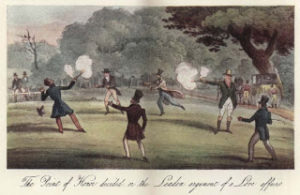In England, dueling was part of a long-standing code of honor, far beyond mere tradition. Gentlemen took their dueling very seriously; they would rather die than be dishonored. Today, we’d call it misplaced pride, or an overdeveloped sense of vengeance, or really stupid, but hey, that was a different world with a different set of rules. And yeah, I’m extremely grateful the men we love don’t settle their differences like this.

Duelling pistols
By the Regency Era, dueling was outlawed. However, duels still happened more frequently than many people knew. The problem was, because courts were made up of peers, they were reluctant to charge another peer with murder as a result of a duel. There is a case where one nobleman was charged with murder and tried, but used the defense that his behavior was gentlemanly and honorable, meaning that he acted within the proper code of conduct. He was acquitted by his peers.
If they were socially equal, or at least similar, the gentleman who was offended would tell the man who’d wronged him that he should choose his “second,” a close friend or family member who would look out for his best interests. If he was really incensed, he might slap him with his glove, but that was considered extreme and beneath gentlemanly behavior, as it was the ultimate insult and probably resulted in a fight then and there.

Cruikshank, The Point of Honor decided, or the Leaden argument of a Love affaire, from The English Spy, 1825
The procedure for issuing a challenge was very specific. A gentleman never challenged a social inferior. For instance, a gentleman of significance with ties to the aristocracy or nobility would never challenge a commoner, such as a blacksmith or a farmer. Also, if there was a significant age difference, the duel would not be extended.
After the verbal challenge – or perhaps warning would be a better word – was issued, depending on the severity of the offense, the other might have a choice; he could either apologize, or he could accept. Sometimes, the apology would not be accepted, often if there were a third person who’d been wronged such as a lady’s honor. (Okay, call me crazy but that almost makes me want to swoon.)
The next day, supposedly after heads had cooled, the wronged man who wished to duel would send his “second” usually a trusted friend, with a written letter challenging the duel. The recipient may chose to apologize or accept the challenge. If accepted, he would choose swords or pistols, and name the time and the place where he wish the duel to take place. In my humble opinion, swords was a more more gentlemanly way to duel. Shooting at someone seems more cold-blooded, but I’m sure it took a great deal of courage to stand still and take aim at someone who was also taking aim at them.
When the allotted day arrived, they met, usually at dawn, in a remote place such as Putney Heath or Battersea Fields which were near London, yet secluded enough to reduce their chances of being caught by the law. Seconds inspected the weapons to be used. A final opportunity for an apology could be given. If not, the seconds decided if the duel should be fought to (a) first blood, or (b) until one can no longer stand, or © to the death. Once that was decided, the opponents dueled and the seconds watched to insure that nothing dishonorable happened. f the combatants used pistols, they only took one shot.
If, during a duel fought by swords, one of the duelers became too injured to continue, occasionally the second would step in and duel. Sometimes, the seconds were hot-headed or very angry (loyal?) and ended up dueling each other as well. This never happened is the duel were fought with pistols since, to my knowledge, one shot was only ever used.
As horrible as it sounds to our modern selves, these gentlemen took their honor very seriously, and considered death preferable to living with the label of a coward, a label that would follow them and their families for years.
And, maybe it’s me, but there a certain romance about a gentleman brave enough and protective enough to be willing to risk death defending my honor from another man who’d besmirched it.
Regency Duels, Affaires of Honor posted first on
http://donnahatchnovels.tumblr.com/

No comments:
Post a Comment